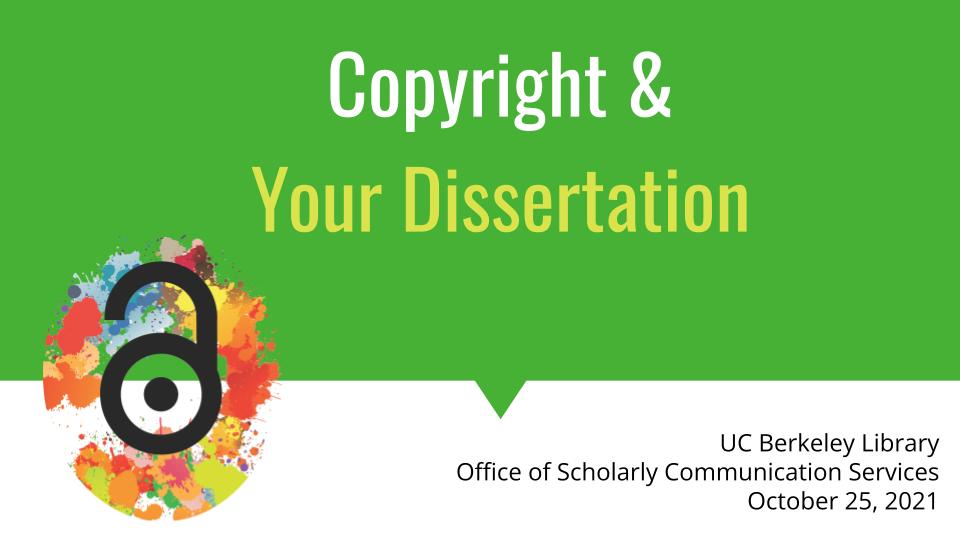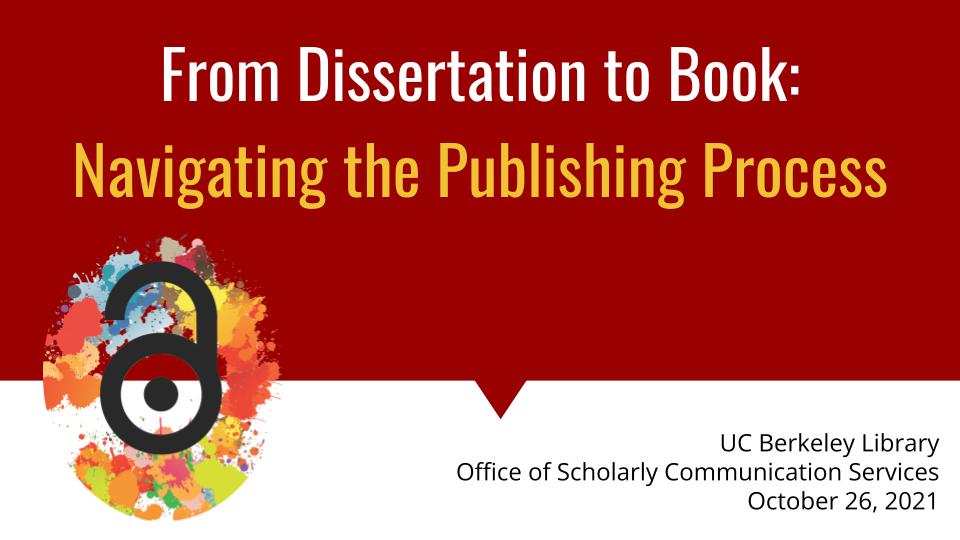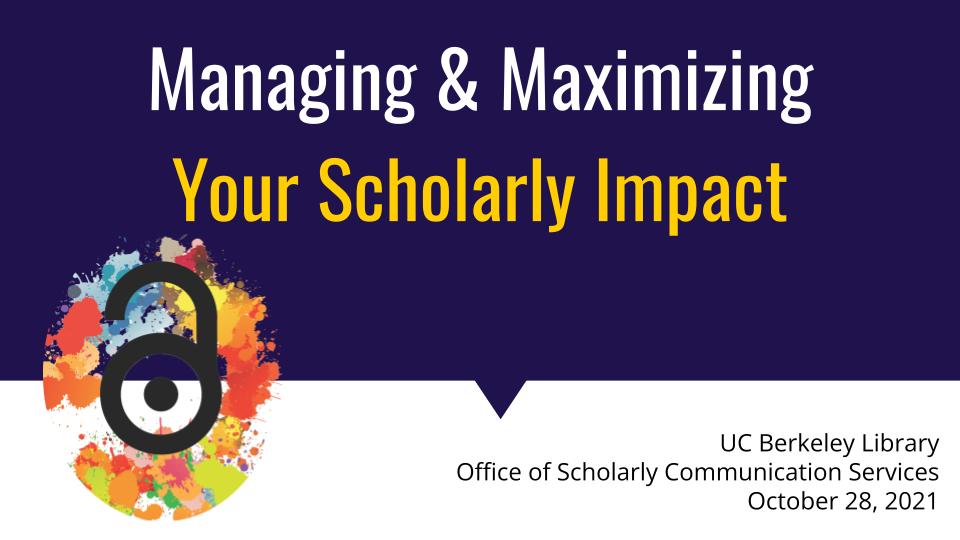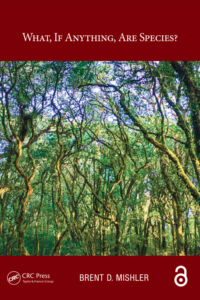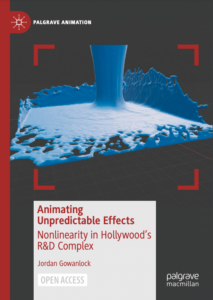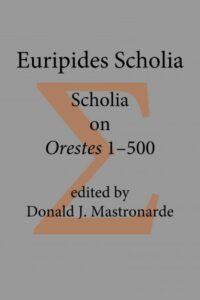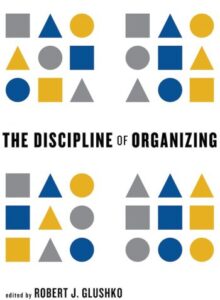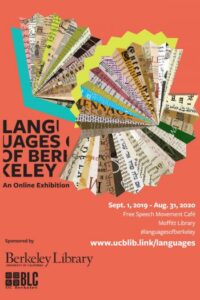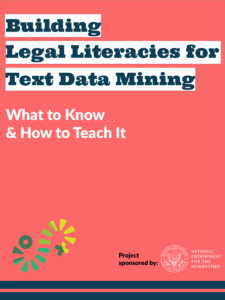Tag: publishing
Fall 2022 copyright and publishing workshops with the Office of Scholarly Communication Services

With the school year kicking off this week in Berkeley, the Office of Scholarly Communication Services is here to help UC Berkeley faculty, students, and staff understand copyright and scholarly publishing with online resources, Zoom workshops, and consultations.
Here’s what’s coming up this semester.
Workshops
Publish Digital Books & Open Educational Resources with Pressbooks
Date/Time: Tuesday, September 20, 2022, 11:00am–12:30pm
RSVP for Zoom link
If you’re looking to self-publish work of any length and want an easy-to-use tool that offers a high degree of customization, allows flexibility with publishing formats (EPUB, PDF), and provides web-hosting options, Pressbooks may be great for you. Pressbooks is often the tool of choice for academics creating digital books, open textbooks, and open educational resources, since you can license your materials for reuse however you desire. Learn why and how to use Pressbooks for publishing your original books or course materials. You’ll leave the workshop with a project already under way.
Copyright and Your Dissertation
Date/Time: Tuesday, September 27, 2022, 11:00am–12:30pm
RSVP for Zoom link
This workshop will provide you with practical guidance for navigating copyright questions and other legal considerations for your dissertation or thesis. Whether you’re just starting to write or you’re getting ready to file, you can use our tips and workflow to figure out what you can use, what rights you have as an author, and what it means to share your dissertation online.
Managing and Maximizing Your Scholarly Impact
Date/Time: Tuesday, October 11, 2022, 11:00am–12:30pm
RSVP for Zoom link
This workshop will provide you with practical strategies and tips for promoting your scholarship, increasing your citations, and monitoring your success. You’ll also learn how to understand metrics, use scholarly networking tools, evaluate journals and publishing options, and take advantage of funding opportunities for Open Access scholarship.
From Dissertation to Book: Navigating the Publication Process
Date/Time: Tuesday, October 18, 2022, 11:00am–12:30pm
RSVP for Zoom link
Hear from a panel of experts—an acquisitions editor, a first-time book author, and an author rights expert—about the process of turning your dissertation into a book. You’ll come away from this panel discussion with practical advice about revising your dissertation, writing a book proposal, approaching editors, signing your first contract, and navigating the peer review and publication process.
How to Publish Open Access at UC Berkeley
Date/Time: Tuesday, October 25, 2022, 11:00am–12:30pm
RSVP for Zoom link
Are you wondering what processes, platforms, and funding are available at UC Berkeley to publish your research open access (OA)? This workshop will provide practical guidance and walk you through all of the OA publishing options and funding sources you have on campus. We’ll explain: the difference between (and mechanisms for) self-depositing your research in the UC’s institutional repository vs. choosing publisher-provided OA; what funding is available to put toward your article or book charges if you choose a publisher-provided option; and the difference between funding coverage under the UC’s “transformative agreements” vs. the Library’s funding program (Berkeley Research Impact Initiative). We’ll also give you practical tips and tricks to maximize your retention of rights and readership in the publishing process.
Copyright and Fair Use for Digital Projects
Date/Time: Tuesday, November 8, 2022, 11:00am–12:30pm
RSVP for Zoom link
This training will help you navigate the copyright, fair use, and usage rights of including third-party content in your digital project. Whether you seek to embed video from other sources for analysis, post material you scanned from a visit to the archives, add images, upload documents, or more, understanding the basics of copyright and discovering a workflow for answering copyright-related digital scholarship questions will make you more confident in your project. We will also provide an overview of your intellectual property rights as a creator and ways to license your own work.
Other ways we can help
In addition to the workshops, we’re here to help answer a variety of questions you might have on intellectual property, digital publishing, and information policy.
- Check out our website for information on issues such as copyright and fair use, text data mining, and how to participate in UC’s Open Access Policy.
- Interested in publishing your research Open Access? UCB Library can help defray the costs of an article processing charge (up to $2,500) or book processing charge (up to $10,000). See the Berkeley Research Impact Initiative (BRII) for more information. And explore the various UC-wide transformative open access agreements and discounts that can help UC corresponding authors publish their scholarship open access.
- Do you want to create an open digital textbook? Take a look at UC Berkeley’s Open Book Publishing platform (anyone with a @berkeley.edu email can sign up for a free account), and get in touch with us about our Open Educational Resources (OER) grant program.
- Keep an eye on our events calendar for more workshops and trainings.
- Follow our blog, social media, and YouTube channel.
Want help or more information? Send us an email. We can provide individualized support and personal consultations, online class instruction, presentations and workshops for small or large groups & classes, and customized support and training for departments and disciplines.
Changes ahead for sharing open access articles on eScholarship

Note from October 21, 2022: this post has been updated with new rollout dates. Please see below.
If you are a University of California academic author who is employed at the UC but not part of the Faculty Senate, you will soon have a new way to post copies of scholarly articles you’ve written into eScholarship.org, the UC’s open access repository.
This blog post answers questions and provides assistance to those authors affected by this change.
What is happening?
There will be a procedural change to how certain UC authors upload copies of their scholarly articles to the UC’s institutional repository to make these articles available “open access.”
Publishing scholarship “open access” means making it available to be read online by anyone at no cost to the reader. Within the UC, there are many ways to publish “open access”, including by “depositing” or uploading a copy of your “author accepted manuscript” into the UC’s institutional repository. Author accepted manuscripts (or AAMs) are the final textual version of your article without publisher formatting and final copy edits.
What’s happening now are changes to how some of you may be doing the uploading of AAMs to eScholarship. Some UC Berkeley scholars (i.e. faculty senate authors) already use a special software system for the uploading process, whereas other scholars (i.e. anyone else employed within the UC who creates academic scholarship) instead upload AAMs directly to escholarship.org through the eScholarship website. Soon, everyone (that is both faculty and all other employees who create scholarly works) will begin using the special software system for uploading.
The software system is called UC’s Publication Management System. In addition to streamlining how you undertake the uploading of your AAMs, the software also proactively searches published literature for articles that it thinks you authored and should deposit. If the system identifies an article that it thinks you’ve published, you will receive an e-mail notification (on a bi-monthly basis) requesting that you upload your AAMs through the Publication Management System platform.
So, nothing is changing for you if you’re a faculty author who already has access to and uses the Publication Management System. But for all other academic authors within the University of California, you’re soon going to get a new way to deposit your AAMs to eScholarship, and will receive periodic e-mails letting you know when to do it.
Why is this happening?
The University of California has two open access policies addressing the deposit of AAMs into the eScholarship repository. One such policy pertains to Academic Senate faculty and has been in place since 2013. The other, called the Presidential Open Access Policy (because it was issued by the UC President in 2015), covers non-faculty authors. Specifically, the Presidential Open Access Policy includes non-senate researchers, lecturers, post-doctoral scholars, administrative staff, librarians, and graduate student employees.
California Digital Library, which oversees and manages the eScholarship repository, had already added everyone covered by the Academic Senate open access policy to the UC Publication Management System, making it easier for Academic Senate faculty to get their articles into eScholarship..
To date, however, authors covered by the Presidential Open Access Policy have only been able to upload their articles directly via the eScholarship website, and have not yet had access to the facilitation software. California Digital Library is now adding these “Presidential” policy authors to the Publication Management System, too.
Who is affected?
Scholarly authors who are employed by the UC and who are not part of the Faculty Senate.
Faculty Senate authors already use the UC Publication Management System software to upload their articles to eScholarship. Soon, non-Faculty Senate authors will also begin using the software to make their uploads, rather than uploading their AAMs directly via the eScholarship.org website.
How does the software work?
UC’s Publication Management System software searches multiple publication databases (such as Scopus, Web of Science, and others) to automatically locate scholarly articles written by UC authors, and sends them a periodic e-mail alert (about twice a month) to review the publications identified under their name, and upload a policy-compliant version of the article. The UC’s Open Access Policies grants covered authors the right to share their author accepted manuscript (the final, peer-reviewed, but not yet publisher-formatted version) immediately upon publication in a journal.
In addition to using the Publication Management System to claim and upload open access versions of articles, authors can also integrate scholarly profiles (such as ORCID), generate individual publishing reports, and get up-to-date statistics on the work they’ve authored while at the UC.
When is this happening?
The California Digital Library is rolling out the change over the course of a few months. This means that after the date outlined below, affected authors will begin to claim and upload their articles using the Publication Management System, and they’ll be notified via e-mail when there is an action they need to take.
If you are a non-Faculty Senate author in one of the following departments or units, you can expect California Digital Library to add you to the Publication Management System according to the following schedule:
June 2022
UC Berkeley libraries
July 2022 [New date: November 30, 2022]
Letters & Sciences – Arts & Humanities
Letters & Sciences – Biological Sciences
Letters & Sciences – Math & Physical Sciences
Letters & Sciences – Social Sciences
August 2022 [New date: January 18, 2023]
College of Chemistry
College of Environmental Design
College of Natural Resources
College of Engineering
September 2022 [New date: February 1, 2023]
UC Berkeley School of Law
Goldman School of Public Policy
Haas School of Business
School of Education
School of Information
School of Journalism
School of Optometry
School of Public Health
School of Social Welfare
March 1, 2023: All other academic units not situated under a college, school, or department classification mentioned above.
Where can authors get assistance?
Authors covered under the Presidential Open Access Policy can explore the UC Publication Management System now by logging in at https://oapolicy.universityofcalifornia.edu/. However, the Publication Management System will not begin sending e-mail notifications until the approximate rollout date indicated above.
California Digital Library maintains documentation and FAQs on how to navigate and use the Publication Management System, including helpful articles about how to get started with claiming and depositing your OA-compliant articles.
UC Berkeley Library staff are here to provide additional assistance. Please send your questions to oapolicy@lists.berkeley.edu and we’ll be in touch.
Reminder: 3 grad student publishing workshops coming up soon
The Office of Scholarly Communication Services is again offering a slate of workshops aimed to help graduate students understand copyright in the context of their dissertation or thesis, demystify the book publishing process, and manage their scholarly profile. Click the links below to sign up and get the Zoom details.
Copyright and Your Dissertation
October 25, 2021
1:00pm–2:30pm
RSVP
This workshop will provide you with practical guidance for navigating copyright questions and other legal considerations for your dissertation or thesis. Whether you’re just starting to write or you’re getting ready to file, you can use our tips and workflow to figure out what you can use, what rights you have as an author, and what it means to share your dissertation online.
From Dissertation to Book: Navigating the Publication Process
October 26, 2021
1:00pm–2:30pm
RSVP
Hear from a panel of experts—an acquisitions editor, a first-time book author, and an author rights expert—about the process of turning your dissertation into a book. You’ll come away from this panel discussion with practical advice about revising your dissertation, writing a book proposal, approaching editors, signing your first contract, and navigating the peer review and publication process.
Managing and Maximizing Your Scholarly Impact
October 28, 2021
1:00pm–2:30pm
RSVP
This workshop will provide you with practical strategies and tips for promoting your scholarship, increasing your citations, and monitoring your success. You’ll also learn how to understand metrics, use scholarly networking tools, evaluate journals and publishing options, and take advantage of funding opportunities for Open Access scholarship.
Back in action with your scholarship

As the school year restarts in Berkeley, we know the pandemic is not over. But the Office of Scholarly Communication Services is here to help UC Berkeley faculty, students, and staff understand copyright and scholarly publishing with online resources, Zoom workshops, and virtual consultations.
If you’re interested in a recap of our progress and achievement over the last year, check out our 2020-21 annual report.
Here’s what’s coming up this semester.
Upcoming Workshops
Publish Digital Books and Open Educational Resources with Pressbooks
September 14, 2021
11:00am–12:30pm
RSVP
If you’re looking to self-publish work of any length and want an easy-to-use tool that offers a high degree of customization, allows flexibility with publishing formats (EPUB, PDF), and provides web-hosting options, Pressbooks may be great for you. Pressbooks is often the tool of choice for academics creating digital books, open textbooks, and open educational resources, since you can license your materials for reuse however you desire. Learn why and how to use Pressbooks for publishing your original books or course materials. You’ll leave the workshop with a project already under way! Signup at the link below and the Zoom login details will be emailed to you.
Copyright and Your Dissertation
October 25, 2021
1:00pm–2:30pm
RSVP
This workshop will provide you with practical guidance for navigating copyright questions and other legal considerations for your dissertation or thesis. Whether you’re just starting to write or you’re getting ready to file, you can use our tips and workflow to figure out what you can use, what rights you have as an author, and what it means to share your dissertation online.
From Dissertation to Book: Navigating the Publication Process
October 26, 2021
1:00pm–2:30pm
RSVP
Hear from a panel of experts—an acquisitions editor, a first-time book author, and an author rights expert—about the process of turning your dissertation into a book. You’ll come away from this panel discussion with practical advice about revising your dissertation, writing a book proposal, approaching editors, signing your first contract, and navigating the peer review and publication process.
Managing and Maximizing Your Scholarly Impact
October 28, 2021
1:00pm–2:30pm
RSVP
This workshop will provide you with practical strategies and tips for promoting your scholarship, increasing your citations, and monitoring your success. You’ll also learn how to understand metrics, use scholarly networking tools, evaluate journals and publishing options, and take advantage of funding opportunities for Open Access scholarship.
Copyright and Fair Use for Digital Projects
November 10, 2021
11:00am–12:30pm
RSVP
This training will help you navigate the copyright, fair use, and usage rights of including third-party content in your digital project. Whether you seek to embed video from other sources for analysis, post material you scanned from a visit to the archives, add images, upload documents, or more, understanding the basics of copyright and discovering a workflow for answering copyright-related digital scholarship questions will make you more confident in your project. We will also provide an overview of your intellectual property rights as a creator and ways to license your own work.
Other ways we can help
We’re here to help answer a variety of questions you might have on intellectual property, digital publishing, and information policy.
- Check out our website for information on issues such as copyright and fair use, the scholarly publishing lifecycle, and UC’s Open Access Policy.
- Interested in publishing your research Open Access? UCB Library can help defray the costs of an article processing charge (up to $2,500) or book processing charge (up to $10,000). See the Berkeley Research Impact Initiative (BRII) for more information. There are also opportunities to publish open access via one of the UC’s Transformative Open Access Agreements.
- Do you want to create an open digital textbook? Take a look at UC Berkeley’s Open Book Publishing platform (anyone with a @berkeley.edu email can signup for a free account), and get in touch with us about our Open Educational Resources (OER) grant program. Also check out our recent blog post which highlights some recent open access books made possible via the Library.
- Keep an eye on our events calendar for more workshops and trainings.
- Follow our blog and social media.
Want help or more information? Send us an email at schol-comm@berkeley.edu. We can provide individualized support and personal consultations, online class instruction, and customized support and training for departments.
Supporting open access book publishing at UC Berkeley: Summer 2021 update
The University of California has taken a multi-faceted approach to supporting open access (OA). For instance, UC’s open access policies ensure that university-affiliated authors can deposit their final, peer-reviewed research articles into eScholarship, our institutional repository, where the articles may be read by anyone for free. The UC has entered into several transformative open access agreements, with the dual goal of enabling universal open access to all UC research and containing the excessively high costs associated with licensing journals. UC also has been supporting new publishing models, such as Berghan Open Anthro’s Subscribe-to-Open.
At the local level, UC Berkeley Library continues to offer the Berkeley Research Impact Initiative (BRII). This program helps UC Berkeley authors defray article processing charges (APCs) that are sometimes required to publish in fully open access journals (note that BRII doesn’t reimburse authors for publishing in “hybrid” journals—that is, subscription journals that simply offer a separate option to pay to make an individual article open access). This past year BRII provided funding for the publication of 83 open access journal articles.
The Office of Scholarly Communication Services is involved in several efforts to help journals change from subscription access to open access, including through Transitioning Society Publication to Open Access (TSPOA), and the Open Access Community Investment Program (OACIP).
Ok, great. But what about books?
The number of open access books continues to grow. As of August 2021, the Directory of Open Access Books indexes 43,793 books. The Open Access Scholarly Publishing Association recently reported that over 1,600 open access books were published by its members in 2020, which represents a growth of over 16% over the previous year.
We know that not all University of California authors are publishing journal articles, and many disciplines—such as arts & humanities and social sciences—focus on the scholarly monograph (in other words, a book) as the preferred mode of publishing. And in contrast with journal articles, books typically cost significantly more to produce. At the systemwide level, the UC is supporting several open access book publishing ventures, including The Open Library of Humanities, which publishes open access scholarship with zero author facing charges, and Knowledge Unlatched, a collection of primarily open access book publishers seeking support from libraries.
So what is UC Berkeley doing to support OA book publishing? Let’s have a look.
Springer open access books partnership
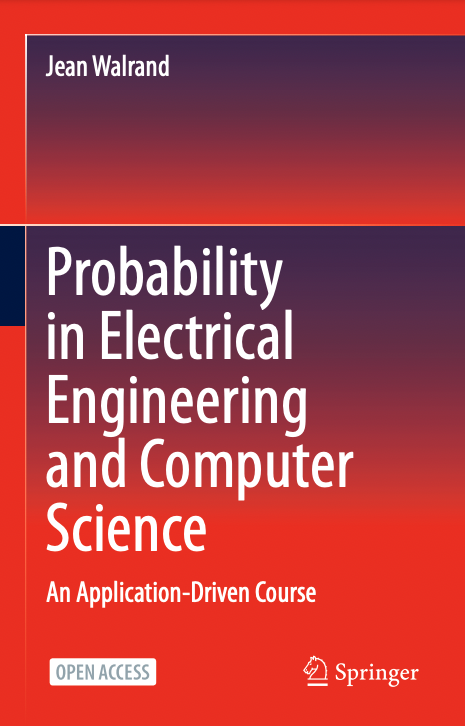
In March 2021, UC Berkeley Library entered into the first-ever institutional open access book agreement with Springer Nature. The partnership provides open access funding to UC Berkeley affiliated authors who have books accepted for publication in Springer, Palgrave, and Apress imprints. This means that these authors can publish their books open access at no direct cost to them. The agreement covers all disciplines published by Springer. It will last for at least three years, and aims to support the publication of four open access books each year. All the books will be published under a Creative Commons Attribution license.
The first book published open access under the UC Berkeley-Springer agreement is Probability in Electrical Engineering and Computer Science, written by Jean Walrand, Professor in the department of Electrical Engineering and Computer Sciences at UC Berkeley. It is available as a CC-BY licensed PDF and EPUB.
Professor Walrand wrote in an email about open access and free digital downloads affect how students and other readers interact with the book.
“Digital resources are more convenient than printed material for searching, hyperlinking, frequent updates, and general access. They enable animations, videos, and interactions with the material, its users, and authors. Moreover, availability of code that complements publications is important in our field. Students are used to reading online. In STEM fields, printed materials are becoming obsolete. However, I believe that carefully edited material is valuable and that good publishers have a useful role to play as editors of digital resources. The open access model is a good step to evolve the role of publishers and libraries. This transition is happening quickly and is challenging.”
BRII support for open access books
We already mentioned how the Berkeley Research Impact Initiative helps UC Berkeley authors publish articles in fully open access journals. BRII funding can also be used to help authors pay book processing charges (up to $10,000/book) so that their monographs can be published open access.
BRII funding has helped several UC Berkeley authors make their books immediately available for free under Creative Commons licenses.
In May 2021 Integrative Biology Professor Brent Mishler published What, if anything, are species? The book is available for anyone to freely read and download under the CC-BY-NC license.
Last year, Jordan Gowanlock (UC Berkeley postdoc in the Department of Film and Media) completed Animating Unpredictable Effects: Nonlinearity in Hollywood’s R&D Complex. The open access book was published by Palgrave Macmillan under a CC-BY license.
Chris Hoofnagle, UC Berkeley Law Professor and Faculty Director of the Berkeley Center for Law & Technology, will publish Law and Policy for the Quantum Age in October 2021 through Cambridge University Press. The open access book was co-written with Simson Garfinkel and will be made available under a CC-BY-NC license. In an email, Professor Hoofnagle wrote about the importance of open access and the financial support he received from BRII:
“Publishing open access is critical to the academic success of this work. A book format was necessary to explain the history and nuances of quantum technologies. Open access gives the work the public availability of an article and the room needed to develop a story that can’t be told in an article-length exposition. We are thankful to BRII for this support.”
Open access at the University of California Press
UC Berkeley Library continues to support open access book publishing via Luminos, the OA arm of the University of California Press. The Library membership with Luminos means that UC Berkeley authors who have books accepted for publication through the UC Press can publish their book open access with a heavily discounted book processing charge. When combined with additional funding support through BRII, a UC Berkeley book author could potentially publish an OA book with the costs being covered fully by the Library. Luminos books are published under Creative Commons licenses with free downloads.
What Is a Family? Answers from Early Modern Japan was published by Luminos in 2019, with financial support from BRII. It was co-written by UC Berkeley Department of History Emerita Professor Mary Elizabeth Berry. What Is a Family? is available as an openly licensed ebook in EPUB, MOBI, and PDF formats.
Pressbooks open book platform
The UC Berkeley Library hosts a version of Pressbooks, an online platform through which the UC Berkeley community can create open access books, open educational resources (OER), and other types of digital scholarship. UC Berkeley authors have published several books via Pressbooks over the last year, including Euripides Scholia, The Discipline of Organizing, The Languages of Berkeley, and Building Legal Literacies for Text Data Mining.
Pressbooks provides for web viewing, as well as ebook downloads in a variety of formats, including PDF and EPUB. Anyone with an @berkeley.edu email can create and publish ebooks on Pressbooks. And, the Office of Scholarly Communication Services continues to offer small grants of up to $5,000 to Berkeley faculty or instructors who wish to create open educational resources or open textbooks that are aimed to be used in instruction.
Investing in the broader OA book publishing community
Back in April we wrote about how the UC Berkeley Library’s Collection Services Council was working to develop local best practices to guide investment in open access products and services. The Library is now working on an implementation plan that embeds the criteria into decision making about whether (and how) to invest in OA resources, memberships, and projects, including OA book publishing initiatives.
We’re starting to kick the tires of the review criteria and process based on requests we’ve already received to invest in new types of open access book support models. For example, the University of Michigan Press is testing a publishing model that asks for upfront investment from the library community in order to support new open access book publishing. Under their Fund to Mission Open Access Monograph Model, if the press meets a specific financial investment goal, they’ll make 50% of their 2022 titles open access. The more investment they receive from the library community, the greater percentage they publish open access from the get go. Libraries are granted term access to their backlist for the duration they are offering support. UC Berkeley Library has evaluated the proposal of the University of Michigan Press Ebook Collection and decided to financially support the initiative for the next three years.
Wrapping up
In this post, we discussed the many ways that the University of California—and specifically UC Berkeley—is supporting scholarly authors to create and share open access books. In addition to providing financial assistance, platforms, and publishing guidance, the Library is committed to promoting the broader OA book publishing ecosystem through strategic investment of our collections budget. We’ll continue to explore a variety of approaches to support the UC Berkeley community (and beyond) who wish to publish books on open access terms.
If you’re interested to learn more about how you can create and publish and open access book, visit our website or send an email to schol-comm@berkeley.edu.
Springer Nature and UC Berkeley Library sign new open access book partnership
Cross-posted at Springer Nature.
Agreement to publish open access books across all subject areas will increase the reach and impact of future publications.
Berkeley | Heidelberg | London, 23 March 2021
Springer Nature has signed its first ever institutional open access (OA) book agreement with the University of California, Berkeley Library. The agreement will cover a broad range of book titles across all disciplines — from humanities and social sciences to sciences, technology, medicine and mathematics and, starting in 2021 and running for at least three years, will provide open access funding to UC Berkeley affiliated authors. The open access book titles will publish under the Springer, Palgrave, and Apress imprints, with initial titles set to publish later this year.
This agreement with UC Berkeley Library follows the UC systemwide landmark transformative agreement with Springer Nature announced last year to enable UC authors to publish research articles open access in over 2700 Springer Nature journals. While the transformative deal covers the publication of journal articles, books are the common or expected publishing format in some disciplines. The need to account for a variety of scholarly outputs prompted UC Berkeley Library to sign a new agreement providing direct assistance to book-publishing authors.
The books will be published under a CC BY licence and readers around the world will have free access to the books via Springer Nature’s content platform SpringerLink. With research showing that open access books are downloaded ten times more often and cited 2.4 times more, this important agreement will significantly enhance the visibility, dissemination and impact of important academic research.
Niels Peter Thomas, Managing Director Books, Springer Nature, said:
“We are delighted to be partnering with UC Berkeley Library in what is our first ever institutional partnership for open access books and our first US agreement for open access books. This represents a big step towards ensuring access to funding for book authors. By utilising our experience as the largest academic book publisher and expertise in enabling the transition to open access, we look forward to increasing the impact and reach of book authors at UC Berkeley and their research.”
Jo Anne Newyear-Ramirez, UC Berkeley Library’s Associate University Librarian for Scholarly Resources, said:
“UC Berkeley Library has been working with publishers to create sustainable and inclusive paths to open access, for both scholarly articles and books. For the past several years, through our Berkeley Research Impact Initiative, we have covered a significant portion of book processing charges for any open access book our authors publish, but this agreement with Springer Nature takes an even bigger leap forward. Under this agreement, we will cover 100% of standard publishing costs for open access books that UC Berkeley authors publish with Springer Nature for at least the next three years. This will help yield important progress on our journey to advance knowledge by making more UC Berkeley-authored books open to the world. We’re equally thrilled to be pioneers among U.S. academic institutions in entering into this type of agreement with Springer Nature.”
END
About UC Berkeley Library
The UC Berkeley Library is an internationally renowned research and teaching facility at one of the nation’s premier public universities. With 24 distinct destinations, including Doe and Moffitt libraries, The Bancroft Library, the C. V. Starr East Asian Library, and an array of subject specialty libraries, the UC Berkeley Library offers services and materials that span the disciplines. The Library holds paintings, lithographs, papyri, audio and video recordings, and books, and offers robust services that connect users with these remarkable resources — and more — to inform their research and advance their understanding of the world.
About Springer Nature
For over 175 years Springer Nature has been advancing discovery by providing the best possible service to the whole research community. We help researchers uncover new ideas, make sure all the research we publish is significant, robust and stands up to objective scrutiny, that it reaches all relevant audiences in the best possible format, and can be discovered, accessed, used, re-used and shared. We support librarians and institutions with innovations in technology and data; and provide quality publishing support to societies.
As a research publisher, Springer Nature is home to trusted brands including Springer, Nature Research, BMC, Palgrave Macmillan and Scientific American. For more information, please visit springernature.com and @SpringerNature
Contact
UC Berkeley Library: With questions about this agreement, please contact UC Berkeley Library’s Office of Scholarly Communication Services: schol-comm@berkeley.edu.
Springer Nature: Felicitas Behrendt | Communications Manager | Felicitas.behrendt@springernature.com | T +49 (0) 6221 487 9901
Spring 2021 workshops from the Office of Scholarly Communication Services
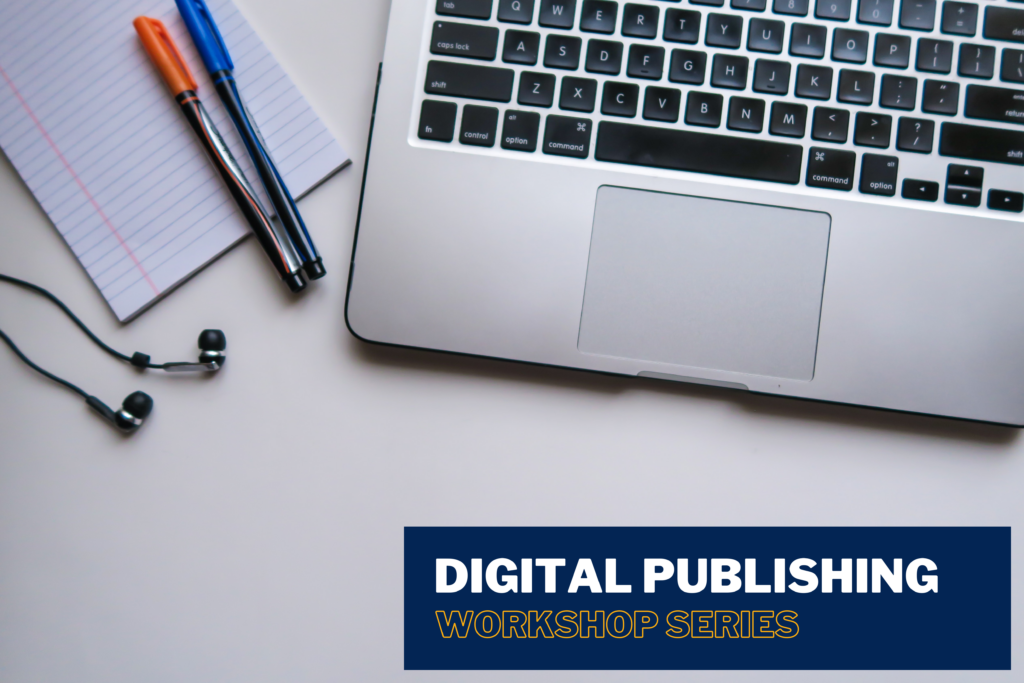
Once again this semester the Office of Scholarly Communication Services will offer workshops as part of the Library’s Digital Publishing Series. Here’s what’s coming up over the next few months.
Upcoming Workshops
Publish Digital Books and Open Educational Resources with Pressbooks
Tuesday, February 9, 2021
2:00–3:30pm
Online: Register to receive the Zoom link
If you’re looking to self-publish work of any length and want an easy-to-use tool that offers a high degree of customization, allows flexibility with publishing formats (EPUB, MOBI, PDF), and provides web-hosting options, Pressbooks may be great for you. Pressbooks is often the tool of choice for academics creating digital books, open textbooks, and open educational resources, since you can license your materials for reuse however you desire. Learn why and how to use Pressbooks for publishing your original books or course materials. You’ll leave the workshop with a project already under way.
Text Data Mining and Publishing
Tuesday, March 16th, 2021
11:00am–12:30pm
Online: Register to receive the Zoom link
If you are working on a computational text analysis project and have wondered how to legally acquire, use, and publish text and data, this workshop is for you! We will teach you 5 legal literacies (copyright, contracts, privacy, ethics, and special use cases) that will empower you to make well-informed decisions about compiling, using, and sharing your corpus. By the end of this workshop, and with a useful checklist in hand, you will be able to confidently design lawful text analysis projects or be well positioned to help others design such projects.
Other ways we can help
In addition to the workshops, we’re here to help answer a variety of questions you might have on intellectual property, digital publishing, and information policy.
- Check out our website for information on issues such as copyright and fair use, the scholarly publishing lifecycle and sharing research data, UC’s Open Access Policy.
- Interested in publishing your research Open Access? UCB Library can help defray the costs of an article processing charge (up to $2,500) or book processing charge (up to $10,000). See the Berkeley Research Impact Initiative (BRII) for more information.
- Do you want to create an open digital textbook? Take a look at UC Berkeley’s Open Book Publishing platform (anyone with a @berkeley.edu email can signup for a free account), and get in touch with us about our Open Educational Resources (OER) grant program.
- Keep an eye on our events calendar for more workshops and trainings.
- Follow our blog and social media.
Want help or more information? Send us an email. We can provide individualized support and personal consultations, online class instruction, presentations and workshops for small or large groups & classes, and customized support and training for departments and disciplines.
Upcoming workshop on how to share and publish data
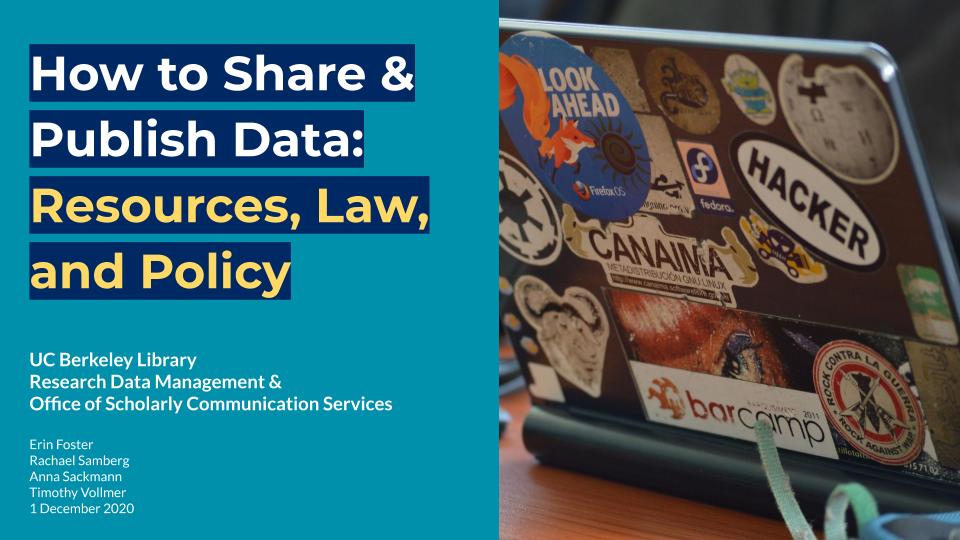
Are you unsure about how you can use or reuse other people’s data in your teaching or research, and what the terms and conditions are? Do you want to share your data with other researchers or license it for reuse but are wondering how and if that’s allowed? Do you have questions about university or granting agency data ownership and sharing policies, rights, and obligations? We will provide clear guidance on all of these questions and more in this interactive webinar on the ins-and-outs of data sharing and publishing.
Join the Library’s Office of Scholarly Communication Services and the Research Data Management Program as we:
- Explore venues and platforms for sharing and publishing data
- Unpack the terms of contracts and licenses affecting data reuse, sharing, and publishing
- Help you understand how copyright does (and does not) affect what you can do with the data you create or wish to use from other people
- Consider how to license your data for maximum downstream impact and reuse
- Demystify data ownership and publishing rights and obligations under university and grant policies
Intended audiences include faculty, grad students, post-docs, instructors, and academic support staff, but anyone interested is welcome to attend.
Publishing workshops
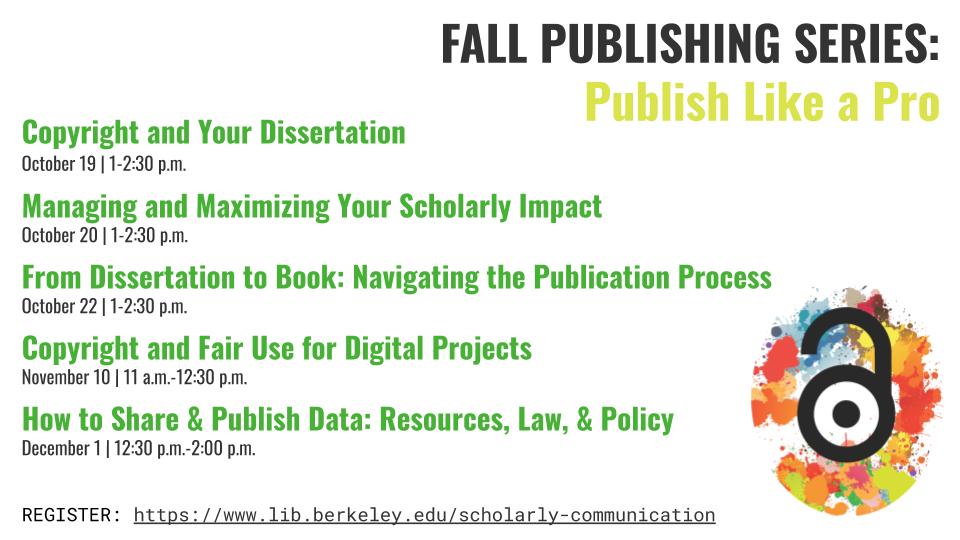
Copyright and Your Dissertation Oct 19, 1-2:30pm
Managing and Maximizing Your Scholarly Impact, Oct 20, 1-2:30pm
From Dissertation to Book: Navigating the Publication Process, Oct 22, 1-2:30pm
Copyright and Fair Use for Digital Projects, Nov 10, 11am-12:30pm
How to Share & Publish Data: Resources, Law & Policy, Dec 1 12:30-2pm
Fall workshops on copyright and publishing

Welcome back to a strange semester. While we can’t meet up together on campus, the Office of Scholarly Communication Services will continue to offer a full slate of online workshops to help students and early career researchers confidently steer their way through the waters of copyright and publishing. Here is what’s in store for the coming few months.
Upcoming Workshops
Publish Digital Books and Open Educational Resources with Pressbooks
September 15, 2020
10:00–11:30am
If you’re looking to self-publish work of any length and want an easy-to-use tool that offers a high degree of customization, allows flexibility with publishing formats (EPUB, MOBI, PDF), and provides web-hosting options, Pressbooks may be great for you. Pressbooks is often the tool of choice for academics creating digital books, open textbooks, and open educational resources, since you can license your materials for reuse however you desire. Learn why and how to use Pressbooks for publishing your original books or course materials. You’ll leave the workshop with a project already under way! Signup at the link below and the Zoom login details will be emailed to you.
Copyright and Your Dissertation
October 19, 2020
1:00–2:30pm
This workshop will provide you with a practical guidance for navigating copyright questions and other legal considerations for your dissertation or thesis. Whether you’re just starting to write or you’re getting ready to file, you can use our tips and workflow to figure out what you can use, what rights you have as an author, and what it means to share your dissertation online.
Managing and Maximizing Your Scholarly Impact
October 20, 2020
1:00–2:30pm
This workshop will provide you with practical strategies and tips for promoting your scholarship, increasing your citations, and monitoring your success. You’ll also learn how to understand metrics, use scholarly networking tools, evaluate journals and publishing options, and take advantage of funding opportunities for Open Access scholarship.
From Dissertation to Book: Navigating the Publication Process
October 22, 2020
1:00–2:30pm
Hear from a panel of experts—an acquisitions editor, a first-time book author, and an author rights expert—about the process of turning your dissertation into a book. You’ll come away from this panel discussion with practical advice about revising your dissertation, writing a book proposal, approaching editors, signing your first contract, and navigating the peer review and publication process.
Copyright and Fair Use for Digital Projects
November 10, 2020
11:00am–12:30pm
This training will help you navigate the copyright, fair use, and usage rights of including third-party content in your digital project. Whether you seek to embed video from other sources for analysis, post material you scanned from a visit to the archives, add images, upload documents, or more, understanding the basics of copyright and discovering a workflow for answering copyright-related digital scholarship questions will make you more confident in your publication. We will also provide an overview of your intellectual property rights as a creator and ways to license your own work.
Archived Recordings
We hosted a few workshops over the summer that might be of interest to you.
Copyright in Course Design & Digital Learning Environments
Video Recording
Slides
If you’re wondering what you can or can’t upload and distribute in your online courses, we’re here to help with answers and best practices. We will cover copyright, fair use, and contractual issues that emerge in online course design. The goal of the webinar is for attendees to gain a deeper understanding of the legal considerations in creating digital courses, and to feel more confident in their content design decisions to support student learning. This webinar is appropriate both for instructors and staff supporting online courses.
Can We Digitize This? Understanding Law, Policy, & Ethics in Bringing our Collections to Digital Life
Video Recording
Slides
As part of the Digital Lifecycle Program, the UC Berkeley Library aims to digitize 200 million items from its special collections (rare books, manuscripts, photographs, archives, and ephemera) for the world to discover and use. But before we can digitize and publish them online for worldwide access, we have to sort out legal and ethical questions. We’ve created and released “responsible access workflows” that will benefit not only our Library’s digitization efforts, but also those of cultural heritage institutions such as museums, archives, and libraries throughout the nation.
Building Legal Literacies for Text Data Mining Institute
Video Recordings
Transcripts + Slides
In June, we welcomed 32 digital humanities (DH) researchers and professionals to the Building Legal Literacies for Text Data Mining (Building LLTDM) Institute. Our goal was to empower DH researchers, librarians, and professional staff to confidently navigate law, policy, ethics, and risk within digital humanities text data mining (TDM) projects—so they can more easily engage in this type of research and contribute to the further advancement of knowledge.
Other ways we can help
In addition to the workshops, we’re here to help answer a variety of questions you might have on intellectual property, digital publishing, and information policy.
- Check out our website for information on issues such as copyright and fair use, the scholarly publishing lifecycle and sharing research data, UC’s Open Access Policy.
- Interested in publishing your research Open Access? UCB Library can help defray the costs of an article processing charge (up to $2,500) or book processing charge (up to $10,000). See the Berkeley Research Impact Initiative (BRII) for more information.
- Do you want to create an open digital textbook? Take a look at UC Berkeley’s Open Book Publishing platform (anyone with a @berkeley.edu email can signup for a free account), and get in touch with us about our Open Educational Resources (OER) grant program.
- Keep an eye on our events calendar for more workshops and trainings.
- Follow our blog and social media.
Want help or more information? Send us an email. We can provide individualized support and personal consultations, online class instruction, presentations and workshops for small or large groups & classes, and customized support and training for departments and disciplines.
